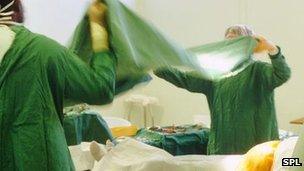Planned repeat C-sections 'safer'
- Published

Surgeons prepare an expectant mother for a C-section delivery
Women opting for a C-section after a previous Caesarean delivery are less likely to suffer severe complications, two studies suggest.
Australian researchers found the risk of stillbirth was lower in women who had a planned repeat C-section rather than trying for a natural labour.
Meanwhile, a UK study found the chance of womb rupture was reduced when mothers had an elective repeat section.
But risks are low for both natural birth and Caesareans, say experts.
A woman should discuss their individual options with their midwife or obstetrician, said the Royal College of Obstetricians and Gynaecologists.
Women who have had a C-section face a dilemma in their next pregnancy about whether to try for a vaginal birth, or to have a repeat section.
The current UK guidelines state that women should be able to choose after discussing the issue with their doctor.
Two papers published in the journalPLoS Medicine, externalfollowed the health outcomes of pregnant women and their babies after a previous C-section.
The UK research is the first to compile national data about the risk of womb rupture - a serious complication of pregnancy, which can cause severe blood loss in the mother and put the baby at risk.
The team from the National Perinatal Epidemiology Unit at Oxford University identified 159 cases of womb rupture between April 2009 and April 2010, with the vast majority of cases - 139 - in women who had already had a Caesarean.
In women who had a previous C-section, the risk of the womb rupturing during labour was seven times higher if they tried for a natural labour, compared with a planned C-section. The risk of the baby dying was three times higher.
However, the overall risk was low - 2 in 10,000 of every UK pregnancies.
Dr Marian Knight of the National Perinatal Epidemiology Unit told the BBC: "This does give a true idea of the risk [of womb rupture] for the first time [in the UK] - in fact it's lower than what we've been estimating before.
"The important thing to remember is the absolute risks - seven times a small risk is still a small risk."
A second study followed more than 2,000 pregnant women planning their second delivery after a previous Caesarean section at 14 hospitals in Australia.
Researchers from the Australian Research Centre for Health of Women and Babies found that women who had a planned Caesarean section experienced less severe bleeding than women who gave birth naturally. There was also a reduced risk of the baby dying in the womb in the Caesarean group.
The experts calculated that one baby death - or near death - would be prevented for every 66 planned repeat Caesarean sections.
They concluded: "Among women with one prior Caesarean, planned elective repeat Caesarean compared with planned vaginal birth after Caesarean was associated with a lower risk of foetal and infant death or serious infant outcome."
Major surgery
Commenting on the studies, Dr Virginia Beckett, spokesperson for the UK's Royal College of Obstetricians and Gynaecologists (RCOG), said: "Choosing a vaginal birth or a Caesarean section carries different risks and benefits but overall either choice is safe with only very small risks.
"It is important that women discuss all the options for their individual case with their midwife or obstetrician.
"Despite there being a slightly higher risk of rupture following a previous Caesarean, the procedure itself carries risks such as risk of blood clots, longer recovery period and the potential need for elective Caesarean in future pregnancies."
Sue Macdonald, the Royal College of Midwives' education and research manager, said: "The information from the study will add to the evidence base and knowledge for midwives and obstetricians and allow them to be able to discuss with women their options for birth after a Caesarean section and whether a normal birth would be possible."